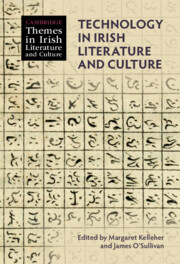Book contents
- Technology in Irish Literature and Culture
- Cambridge Themes in Irish Literature and Culture
- Technology in Irish Literature and Culture
- Copyright page
- Epigraph
- Contents
- Contributors
- Cambridge Themes in Irish Literature and Culture
- Acknowledgements
- Introduction
- Part I Genealogies
- Part II Infrastructures
- Part III Invention
- Chapter 8 Technology, Writing, and Place in Medieval Irish Literature
- Chapter 9 The Critique of Sola Scriptura in A Tale of a Tub and STEM in Gulliver’s Travels
- Chapter 10 Technology and Irish Modernism
- Chapter 11 W. B. Yeats, the Revival, and Scientific Invention
- Chapter 12 James Joyce, Irish Modernism, and Watch Technology
- Chapter 13 Technology, Terminology, and the Irish Language, Past and Present
- Part IV The Digital
- Index
- References
Chapter 9 - The Critique of Sola Scriptura in A Tale of a Tub and STEM in Gulliver’s Travels
from Part III - Invention
Published online by Cambridge University Press: 19 January 2023
- Technology in Irish Literature and Culture
- Cambridge Themes in Irish Literature and Culture
- Technology in Irish Literature and Culture
- Copyright page
- Epigraph
- Contents
- Contributors
- Cambridge Themes in Irish Literature and Culture
- Acknowledgements
- Introduction
- Part I Genealogies
- Part II Infrastructures
- Part III Invention
- Chapter 8 Technology, Writing, and Place in Medieval Irish Literature
- Chapter 9 The Critique of Sola Scriptura in A Tale of a Tub and STEM in Gulliver’s Travels
- Chapter 10 Technology and Irish Modernism
- Chapter 11 W. B. Yeats, the Revival, and Scientific Invention
- Chapter 12 James Joyce, Irish Modernism, and Watch Technology
- Chapter 13 Technology, Terminology, and the Irish Language, Past and Present
- Part IV The Digital
- Index
- References
Summary
This chapter considers Swift’s scepticism of the written and printed word from the perspective of his fear of Dissenting Protestant scriptural exegesis and the putative transparency of print culture. Sola scriptura is the Protestant doctrine, embraced most by evangelical Christians like the Dissenters, that texts alone convey meaning without interpretation (what we call ‘textualism’ in legal interpretation and literary criticism). This essay examines his close personal and intellectual relationship with the Catholic poet Alexander Pope, who was also of the Church most sceptical of sola scriptura, and their joint attack with the rest of the Scriblerus Club against the Whig ideology of textualism and the cult of scientific empiricism (often referred to by critics as ‘naïve empiricism’). This chapter offers both a historical and contemporary perspective on literature and technology, examining Swift’s doubts concerning the printing press as the new information technology of the time and extending this vein of criticism to new digital humanities platforms for Swift’s texts.
Keywords
- Type
- Chapter
- Information
- Technology in Irish Literature and Culture , pp. 154 - 167Publisher: Cambridge University PressPrint publication year: 2023

